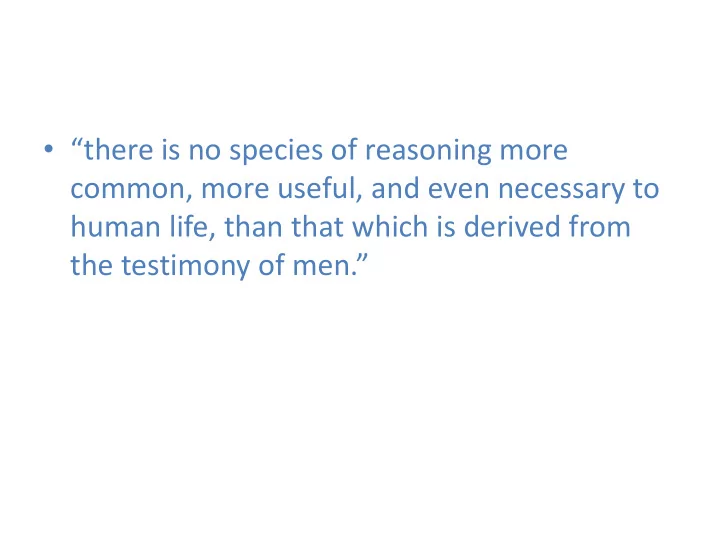

• “there is no species of reasoning more common, more useful, and even necessary to human life, than that which is derived from the testimony of men.”
• Evidentialism: “A wise man … proportions his belief to the evidence.”
• “A miracle is a violation of the laws of nature,” i.e. something that has never happened “in the common course of nature.”
• “no testimony is sufficient to establish a miracle, unless the testimony be of such a kind, that its falsehood would be more miraculous, then the fact, which it endeavors to establish.”
• Hume’s argument 1. You should only trust testimony when you have evidence that the testifier is likely to be right. 2. A miracle is an exception to a previously exceptionless regularity – i.e. something unlikely to have occurred. 3. People often assert falsehoods – i.e. false testimony is not all that unlikely. 4. Therefore, you should never believe that a miracle has occurred, on the basis of testimony
• Principle of credulity: “a disposition to confide in the veracity of others, and to believe what they tell us.”
• “[I]f credulity were the effect of reasoning and experience [as Hume claims], it must grow up and gather strength, in the same proportion as reason and experience do. But, if it is the gift of Nature, it will be strongest in children, and limited and restrained by experience; and the most superficial view of human life shews, that the last is really the case, and not the first.”
• Reid’s argument: 1. The principle of credulity is strongest in children. 2. But if our trust in testimony were based on experience (as Hume claims), it would be weakest in children. 3. Therefore, the principle of credulity is innate and not based on experience.
• If Hume were right, “no proposition that is uttered in discourse would be believed[, and] such distrust and incredulity would deprive us of the greatest benefits of society, and place us in a worse condition than that of the savages.”
• Principle of veracity: “a propensity to speak the truth … so as to convey our real sentiments.” • “Lying … is doing violence to our nature.”
People often have motives to lie, as when “they have an interest in • what they affirm.” There are “advantages” to “starting an imposture among an ignorant people.” Think here of politicians. Human beings are prone to believe “the tales of travellers” because • human beings generally find the feelings of “surprise and wonder” agreeable. In Hume’s day, there were surprising stories arriving in Europe from all over the world – many of them fairly inaccurate. Human beings are prone to testify, regardless of whether they have • good evidence for what they’re saying, because of “[t]he pleasure of telling a piece of news so interesting, of propagating it, and of being the first reporters of it.” This, Hume argued, is why gossip and rumor spread so quickly.
• “Enlightenment is man’s emergence from his self-incurred immaturity. Immaturity is the inability to use one’s own understanding without the guidance of another. […] The motto of the enlightenment is therefore: Sapere aude! Have courage to use your own understanding.”
• Intellectual solidarity: disposition to trust the testimony of your community. • Intellectual autonomy: disposition to form beliefs “on your own,” i.e. not on the basis of testimony.
• “Sapere aude” • “Dare to be wise” • “Dare to know”
Recommend
More recommend